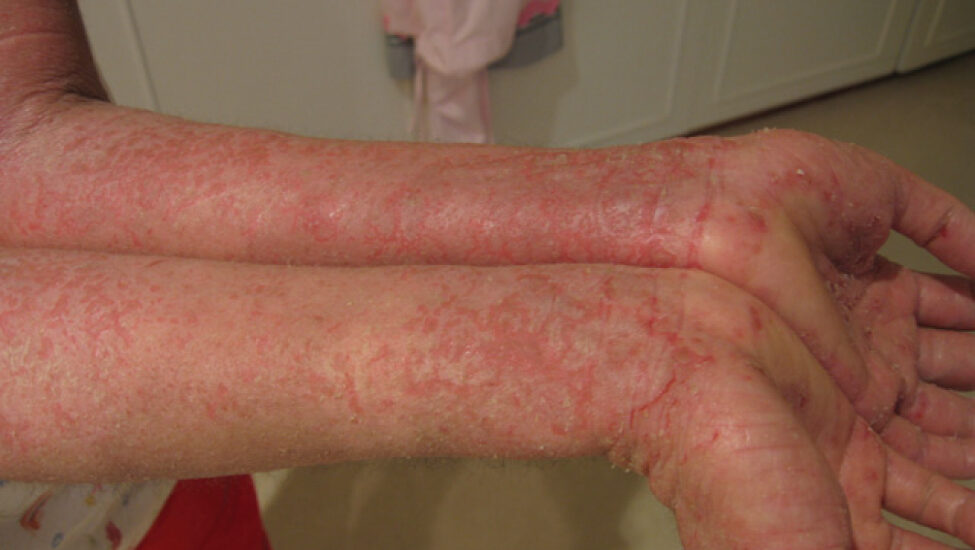If you’re dealing with red skin after eczema, you’ve come to the right place. This comprehensive guide will walk you through the reasons behind this issue and the steps you can take to manage it effectively.

Table of Contents
Understanding Why Red Skin After Eczema Persists
One of the most common questions people have is why redness persists even after an eczema flare-up seems to be over. The lingering redness usually stems from residual inflammation in your skin.
During an eczema flare-up, your skin’s immune response leads to inflammation, itchiness, and redness. When the primary symptoms like itching subside, the redness may still remain as the skin undergoes the healing process.
According to HealthLine, it’s not uncommon for red skin after eczema flare-up to last several weeks after the flare-up has ended. Understanding this can help you manage your expectations and focus on appropriate treatment steps.
How to Treat Red Skin After Eczema Flare-up
Treatment for red skin after eczema flare-up is multifaceted, and it’s essential to understand each option fully:
Topical Steroids: These are specialized creams or ointments that you apply directly to the inflamed skin. They contain medicines that lessen inflammation and therefore help reduce redness. However, they should only be used under professional medical guidance due to potential side effects like skin thinning. You’ll generally need a prescription for stronger topical steroids.
Antihistamines: While primarily used to control itching, antihistamines can also indirectly alleviate redness by preventing you from scratching the inflamed area. Scratching can worsen redness and even lead to infection. Consult your healthcare provider to identify the antihistamine that is right for you.
Cold Compresses: This is a simple home remedy. Applying a cold compress to the red area can provide immediate, albeit temporary, relief. The cold helps constrict blood vessels, reducing redness and inflammation. Always wrap the ice pack in a cloth or towel to avoid ice burns or further irritation.
Does Redness from Eczema Go Away?
Most individuals find that redness diminishes as the skin heals. However, there are instances where redness may persist or even become a long-term issue. Timely medical intervention is vital for preventing complications.
If you find that redness isn’t subsiding, it may require more advanced treatments such as phototherapy or stronger medications, which should only be determined by a healthcare provider.
Check out these other related articles…
White Patches on Skin After Eczema: A Complete Guide
Discoloration of Skin Due to Eczema: Comprehensive 411 Guide
Bumps on Skin From Eczema: A Comprehensive 411 Guide
Lines on Skin from Eczema: Comprehensive 411 Guide
Can Skin Recover From Eczema: The Ultimate Guide to Healing
Skin Peeling After Eczema Flare Up: Healing or Concern?
Does Skin Discoloration from Eczema Go Away? Detailed Answer
Preventing Future Redness
Long-term management is key in preventing red skin after eczema flare-ups. A regular skincare routine, as advised by the American Academy of Dermatology, can significantly reduce the frequency and severity of flare-ups. This routine should include:
Moisturizing: Use creams with a high oil content immediately after showering to lock in moisture. A good example is the belif The True Cream Aqua Bomb listed on Amazon.
Use Gentle Soaps: Soap can strip your skin of essential oils, worsening dryness and redness. Use fragrance-free, mild soaps instead.
Stay Hydrated: Drinking plenty of water helps keep your skin hydrated from the inside.
Humidifier: Using a humidifier can add moisture to dry indoor air, helping to prevent skin dryness. The Rosekm® Humidifiers for Bedroom is highly rated, you can check it out on Amazon.
Consult a Healthcare Provider
If your red skin after eczema doesn’t improve or worsen over time, consulting a healthcare provider for a tailored treatment plan is crucial. They may conduct tests or skin biopsies to rule out any other conditions and provide a treatment plan best suited for your skin type.